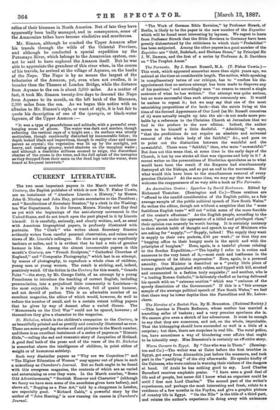CURRENT LITERATURE.
The two most important papers in the March number of the Century, the English publisher of which is now Mr. T. Fisher Unwin, are an instalment of "Abraham Lincoln r a History," by Messrs. John G. Nicolay and John Hay, private secretaries to the President ; and "Recollections of Secretary Stanton," by a clerk in the Washing- ton War Department. In the former, Messrs. Nicolay and Hay deal as yet with the beginnings of the anti.slavery movement in the United States, and do not touch upon the part played in it by Lincoln himself. It is carefully, seriously, and clearly written, and, as usual with American biographical papers, is profusely illustrated with portraits. The " Clerk " who writes about Secretary Stanton evidently writes from careful personal observation, and raises one's views of Mr. Lincoln's colleague. He does not appear so repellently taciturn or sullen, and it is evident that he had a vein of genuine humour in him. Among the almost innumerable papers in this month's Century, are "French Sculptors," "Cathedral Churches of England," and " Composite Photography," which last ie an attempt, by means of photography, to reproduce a whole class of children, young men or young women. The result ie striking, and, indeed, positively weird. Of the fiction in the Century for this month, "Grande Point "—the story, by Mr. George Cable, of an attempt by a young Frenchman to introduce the teaching of correct English, including pronunciation, into a prejudiced little community in Louisiana—is the most enjoyable. It is really clever, full of quaint humour, and not devoid of pathos. This is an admirable number of an excellent magazine, the editor of which would, however, do well to reduce the number of small, and to a certain extent trifling papers that be gives by way of dessert after a varied dinner. The "Memoranda on the Civil War" could not be spared, however ; of themselves they give a character to the magazine.


































 Previous page
Previous page